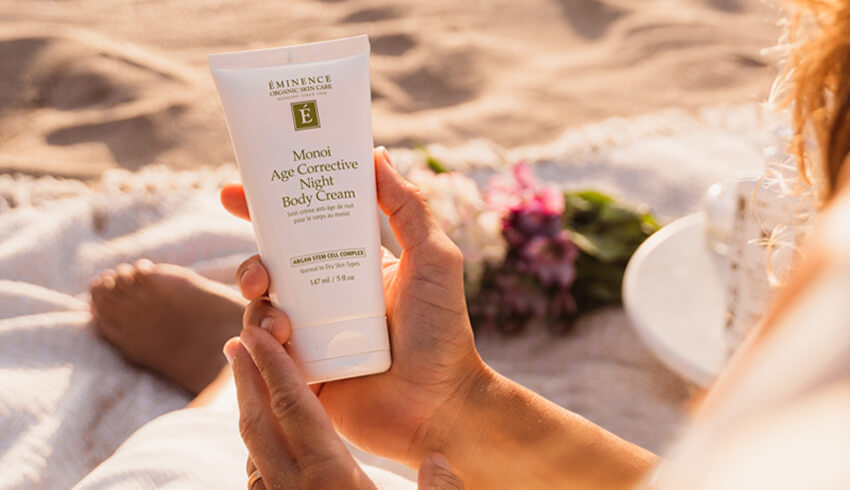Ultimate Guide For Dry Skin: Causes, Symptoms & How To Find Relief

What Causes Skin Dryness?
Like all skin types, dry skin is genetic. It is characterized by an inadequate supply of sebum (which keeps skin lubricated) and lipids (which keep the skin’s moisture barrier intact). Without these essential materials, the skin loses its ability to produce and retain sufficient moisture. On the surface, this deficiency presents as dry, flaky skin and a lackluster complexion.
Skin also becomes thinner and drier with age. Over time, the skin’s stores of hyaluronic acid diminish as a result of the body’s natural aging processes. This naturally-occurring substance, which attracts and retains moisture, is crucial for keeping skin soft and supple, but without lipids or sebum, dry skin cannot stay lubricated and the skin barrier becomes compromised. Dry skin produces less oil than other skin types. This can lead to an increase in transepidermal water loss (TEWL), which can also be worsened with a compromised skin barrier.
Dry skin is often confused with dehydration, but they are really quite different. While dehydration is preventable and easily treated, dry skin is a skin type that requires ongoing care to maintain. You may be stuck with dry skin, but the right skin care routine can make a world of difference. Moisturizers will help dry skin sufferers lock in more moisture, prevent TEWL and keep the skin lubricated.
Dry Skin: 7 Signs & Symptoms
A dry skin type comes with the following signs and symptoms:
- Tightness, especially after cleansing
- Rough texture
- A dull, lackluster appearance
- Barely visible pores
- Flaking, scaling or peeling
- Fine lines, particularly around the eyes and lips
- A tendency toward redness and itching
Why Do I Have Dry Skin?
If you relate to most of the above symptoms, we’re going to recommend a gentle skin care routine to offer you relief from the persistent dryness. Before we do, you might be wondering why exactly you have dry skin in the first place. Previously we mentioned genetics, but there are environmental factors that exacerbate symptoms.
1. Overly Hot Showers And Baths
It might feel soothing at the time, but taking long, hot showers leads to excessively dry skin. It’s hard to hear, particularly if you’re getting relief from the itch by standing under hot water, but dermatologists agree that showering for long periods dries out and damages the skin's surface. Simply restrict showers and baths to 5-10 minutes and use warm water instead of hot.
2. Harsh Product Ingredients
Some soaps strip away the natural oil barrier on your skin, drying you out. Be wary of coming into contact with dishwashing liquid and kitchen soaps that contain irritating chemicals. Whenever you find yourself touching soapy laundry or using cleaning products, wear gloves to protect your hands. This reduces the amount of time you are coming into contact with water and harsh chemicals. For your skin care routine, use only gentle skin care products. For example, try a mild, non-foaming cleanser for your routine, like an oil or hydrating cleanser, rather than a cleanser that forms a lather as it might strip your skin of essential oils.
3. Dry Winter Air
Winter impacts those prone to dry skin greatly, and the lack of humidity is a big reason. Outside, the cold air has less moisture, and when you head indoors, the central heating is most likely pumping through your home or your office. And heating systems severely dry out the air. Consider running a humidifier to replenish moisture to the air in your house. If you’re in the office, or in an environment where you can’t control the heating, keep a moisturizer close at hand to reapply as often as you need.
4. Not Enough Fat In Your Diet
To keep dry skin at bay, include fatty acids in your diet. Fatty acids are omega-3s found in foods like seafood, dairy, canola oil, eggs and meat from grass-fed animals. These foods include essential fatty acids and mono and polyunsaturated fats that contribute to both your skin and your overall health.
5. Not Enough Moisture In The Skin
As previously touched on, dry skin is genetic. You have an inadequate supply of sebum and lipids so the skin has a more difficult time keeping itself lubricated and the moisture barrier intact. To lock in moisture, apply moisturizers immediately after showering or washing your hands. For example, the Monoi Age Corrective Night Cream for Face & Neck contains the superstar ingredient monoi. Monoi is a soothing and protective oil that deeply hydrates the skin and can protect against harsh environmental stressors like the sun or drying salt water.
Help! How Do I Combat Dry Skin Across My Body?
Day Skin Care Routine: Coconut Sugar Scrub
Exfoliate dry skin with Coconut Sugar Scrub. Natural sugar cane granules buff your skin to perfection, while coconut oil deeply hydrates and prevents damage caused by drying. You can also use our Stone Crop Revitalizing Body Scrub for full-body exfoliation.
Evening Skin Care Routine: Stone Crop Body Lotion
After removing that rough layer of dead skin cells, hydrate your newly polished skin with Stone Crop Body Lotion. Formulated with stone crop, lemon and bioflavonoids to enrich, support and moisturize the skin’s appearance.
Nighttime Routine: Monoi Age Corrective Night Body Cream
To combat itchy skin at night, smooth on Monoi Age Corrective Night Body Cream. This ultra-rich body lotion locks in moisture to reveal firm, velvety looking skin by morning. Lightly fragranced with monoi, this body cream helps alleviate itchiness due to dry skin.
Are you ready to find out more about alleviating your tight, dry skin? Read more about our recommended tips and solutions for living with dry skin.